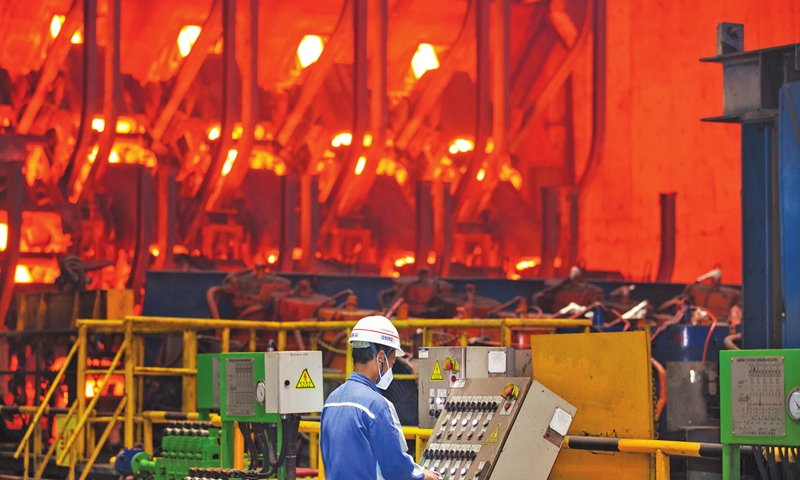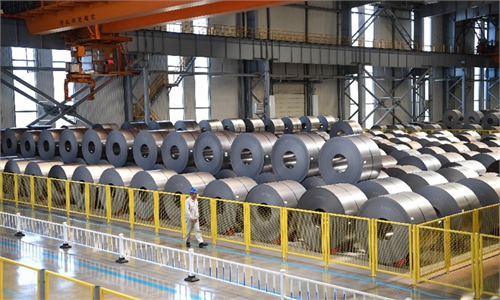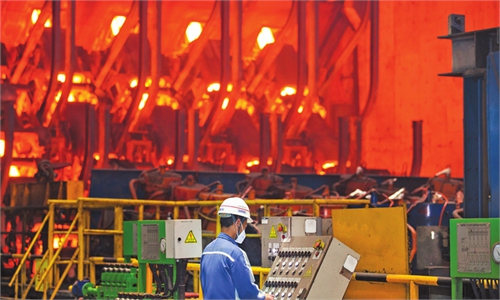
A worker rushes to finish orders for special steel products at a factory of China Baowu Steel Group's specialty steel subsidiary in Maanshan, East China's Anhui Province. Photo: cnsphoto
China's steel shipments to Australia have dwindled by more than 50 percent in recent months, faster than the country's overall steel export plunge, and the trend is set to further accelerate, as China takes more measures to cut output and restrict exports, industry insiders said.
China's shrinking steel supply, against the backdrop of deteriorating bilateral relations, will likely lead to a steel shortage for the recovering Australian economy, which is about to embark on a massive infrastructure plan, analysts pointed out.
Falling output and exports would also sap China's demand for iron ore, Australia's biggest commodity export to China, which some Western media reports have hyped as showing that Beijing cannot "wean itself off" the metal.
A steel exporter based in Tangshan, North China's Hebei Province surnamed Wang told the Global Times on Tuesday that steel exports to Australia had plummeted recently, although the country is not his main export destination.
"Overall steel exports have halved in recent months, but the export slump to Australia was one of the fastest," Wang said.
An employee surnamed Xie at a Shanghai-based professional steel and iron materials export and import company told the Global Times on Tuesday that the company's exports to Australia are very small and have continuously declined, as domestic output has been gradually controlled.
Considering China's goal of reducing carbon emissions and the relatively low cost of steel production, the chances of additional levies on steel exports are high, Xie noted.
Some trade agencies said that they have included terms on shared responsibility for potential steel export tariff hikes in new contracts signed with importers.
"We expect another tariff increase on Chinese steel exports in the second half as the country continues prioritizing domestic supply, so we made it very clear in the clause that the cost of potential tariff hikes should be split equally between both parties," an industry insider said.
According to data released by the National Bureau of Statistics on Monday, China's steel output dived to a 15-month low in July amid efforts to reduce carbon emissions and overhaul the industry to tame a price surge.
China has raised the cost of steel exports twice so far this year. The Chinese government revived taxes on steel exports and cut tariffs for ferrous imports from May 1. Also, starting from August 1, China cancelled more rebates of the value-added tax for some steel exporters.
"This will weigh on the economies of a number of countries, including Australia, which relies heavily on steel imports from China," Wang Guoqing, research director at the Beijing Lange Steel Information Research Center, told the Global Times on Tuesday.
Data from Lange Steel showed that Australia's steel imports from China account for 30 percent of its total steel imports, while Australia only acconts for less than 1 percent of China's steel shipment.
"As Australia reboots its economy, demand for steel is set to further jump with the rollout of more housing and infrastructure construction. That, combined with dwindling imports from China, will only widen the supply gap, which no other country could fill," Wang noted.
According to Xie, some mills in Vietnam used to export steel to Australia, but they are now shut down due to coronavirus flare-ups and other uncertainties.
Analysts also took note of a "domino effect" of the supply cut on Australia's iron ore, whose shipment to China represents over 60 percent of the latter's iron ore imports. The bulk commodity is deemed as a pillar of the Australian economy.
In July, China's iron ore imports went down 21.4 percent year-on-year to 88.5 million tons, falling for a fourth consecutive month customs data showed.


